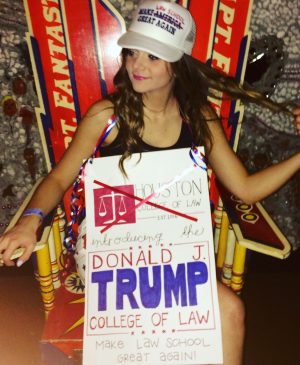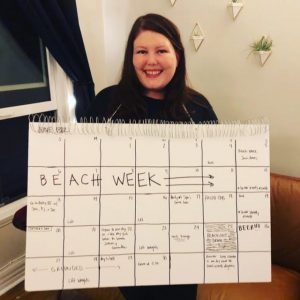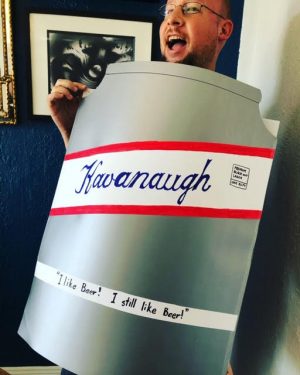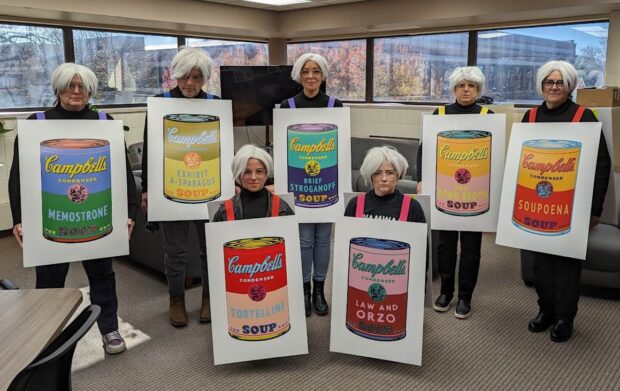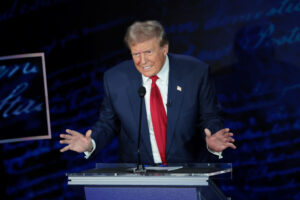
For
most
of
us
versed
in
the
English
language,
“Election
Day”
means
“the
day
that
people
go
out
and
vote.”
Historically,
this
might
have
meant
the
only
day
that
citizens
(just
the
white
men
owning
property
if
we’re
getting
really
originalist)
could
vote.
But
the
country
has
traditionally
recognized
“Election
Day”
more
as
a
deadline
than
a
singular
window
—
the
last
chance
for
any
concerned
citizen
to
cast
their
ballot.
What
the
term
has
never
meant
either
lexically
or
historically
is
that
votes
can’t
be
counted
after
Election
Day
assuming
they
were
validly
and
verifiably
cast
before
the
deadline.
It’s
like
saying
it’s
not
a
valid
birthday
present
if
your
gift
arrives
in
the
mail
the
next
day
just
because
the
mail
doesn’t
deliver
on
Sunday.
They
aren’t
“belated”
gifts
unless
they’re
ordered
after
the
event.
We
all
know
this,
but
a
Fifth
Circuit
panel
of
America’s
thirstiest
conservative
judges
have
disagreed
in
a
new
audition
tape
crafted
for
an
audience
of
one.
Or
maybe
two…
Donald
Trump
and
Federalist
Society
puppetmaster
Leonard
Leo.
Andy
Oldham,
James
Ho,
and
Stuart
Kyle
Duncan
each
imagines
themself
as
Trump’s
next
Supreme
Court
nominee
and
they’ve
demonstrated
a
fierce
interest
in
using
their
office
to
grandstand
for
attention
from
right-wing
media
and
boost
their
Q
score
with
the
QAnon
set.
Oldham
is
prone
to
throwing
lengthy
hissy
fits
when
his
colleagues
cite
statutory
provisions
running
counter
to
his
policy
preferences,
Ho
will
never
shrink
from
a
fight
no
matter
how
bereft
of
logic,
and
Duncan
constantly
scans
the
horizon
for
an
opportunity
to
portray
himself
as
a
victimized
special
snowflake.
Late
last
week,
this
Fifth
Circuit
panel
produced
another
gem
of
Republican
judicial
reasoning,
explaining
that
—
contrary
to
your
dictionary
or
understanding
of
history
—
the
words
“Election
Day”
mean
BOTH
that
ballots
have
to
be
cast
(obviously)
and
received
(wha?)
by
close
of
business.
If
you’re,
say,
in
the
Armed
Forces
serving
the
country
and
hoping
to
vote…
well,
you
might
be
out
of
luck!
This
is
why
Trump
calls
them
“suckers”
and
“losers.”
During
COVID,
the
GOP
made
it
a
priority
to
undermine
public
faith
in
mail-in
voting
and
this
challenge
aimed
to
further
the
effort
by
tossing
ballots
that
Mississippi
state
law
considers
validly
cast
on
or
before
Election
Day
by
rewriting
election
law
to
both
assert
that
when
federal
law
uses
the
term
it
usurps
a
state’s
right
to
manage
its
own
election
and
that
part
of
that
supremacy
requires
striking
down
any
law
allowing
a
ballot
postmarked
before
the
election
but
received
afterward.
So
much
for
federalism.
“Text,
precedent,
and
historical
practice
confirm
this
‘day
for
the
election’
is
the
day
by
which
ballots
must
be
both
cast
by
voters
and
received
by
state
officials,”
they
write.
No
one
ever
thought
this.
Imagine
the
Framers,
living
in
an
age
of
horse-drawn
mail,
conceiving
of
election
results
being
instantly
transmitted
via
modern
technology.
The
Fifth
Circuit
is
home
to
the
city
of
New
Orleans,
where
the
U.S.
once
fought
a
battle
there
after
the
peace
treaty
was
signed
because
everyone
understood
that
news
traveled
at
a
snail’s
pace.
The
opinion
nods
to
this,
suggesting
that
counting
ballots
received
by
Election
Day
can
continue
after
the
end
of
business,
but
ballots
cast
&
postmarked
before
Election
Day
but
not
received
until
later
can’t
be.
There’s
not
much
behind
this
distinction…
from
the
perspective
of
state
tabulators,
ballots
arriving
by
horseback
from
the
far-reaches
of
the
state
were
always
after
Election
Day,
but
understood
to
have
left
the
voter’s
hand
before
the
deadline.
Nor
does
this
make
sense
in
the
context
of
their
claim
that
federal
law
set
an
“Election
Day”
that
then
necessarily
supersedes
any
state
law
regarding
the
casting
or
receiving
of
ballots.
As
Professor
Steve
Vladeck
notes:
That
federal
law
fixes
a
date
for
elections
does
not
thereby
fix
a
date on which
all
votes
must
be
cast
(or
else
all
early
voting
and
mail-in
voting
would
be
unlawful).
But
Republicans
think
early
voting
is
good
so
the
judges’
claim
that
that
the
federal
government
has
set
a
definition
of
a
singular
“Election
Day”
wiping
out
all
state
laws
must
be
artificially
limited
to
just
state
laws
on
the
back
end
of
the
process
and
not
a
bar
on
states
allowing
voting
before
Election
Day.
The
decision
does
not
engage
with
this
fundamental
failing.
“Even
if
the
ballots
have
not
been
counted,
the
result
is
fixed
when
all
of
the
ballots
are
received
and
the
proverbial
ballot
box
is
closed,”
they
contend.
“The
selections
are
done
and
final.”
“Proverbial”
is
a
curious
word
to
use
here
since
the
“proverbial”
ballot
box
could
just
as
easily
include
the
United
States
Postal
Service.
Selections
are
just
as
“done
and
final”
when
dropped
into
the
mailbox
the
day
before
Election
Day.
As
the
opinion
admits,
historically,
the
U.S.
allowed
soldiers
to
dump
ballots
in
a
box
in
the
field
which
would
then
by
transmitted
back
to
the
state’s
central
accounting
long
after.
The
panel
shrugs
this
off
as
different
because
the
box
that
Civil
War
soldiers
used
at
the
time
“counts”
—
in
the
judges’
minds
—
as
a
ballot
box
in
the
way
dropping
it
into
the
federal
postage
system
does
not,
despite
the
military
long
ago
adopting
that
procedure.
To
this,
the
opinion
cites
some
states
that
chose
to
impose
an
earlier
deadline
for
receipt
of
absentee
ballots
and
substituted
this
for
proof
that
states
could
not
set
a
later
date.
This
is
“Jimmy
is
tall,
NBA
players
are
tall,
Jimmy
plays
in
the
NBA”
reasoning
that
the
LSAT
is
designed
to
root
out
of
the
profession.
Not
only
does
this
not
make
sense
logically,
the
“history
and
tradition”
of
the
country
includes
numerous
examples
of
states
accepting
verifiably
cast
but
not
received
ballots
after
an
election
deadline.
Upwards
of
18
states
are
doing
it
right
now!
The
judges
incur
carpel
tunnel
with
all
the
handwaving
required
to
get
out
of
this:
A
few
“late-in-time
outliers”
say
nothing
about
the
original
public
meaning
of
the
Election-Day
statutes.
Now
you
might
think
that
statement
would
be
backed
by
some
case
citation
related
to
Election
Day
statutes.
But
you’d
be
wrong!
Instead,
this
is
backed
by
citation
to
exactly
TWO
cases:
Bruen
and
Dobbs.
Can’t
let
an
opinion
go
by
without
signaling
their
ideological
bona
fides.
There’s
also
no
good
reason
why
federal
law’s
use
of
the
words
“Election
Day”
would
carry
this
meaning
when
there’s
never
been
a
federal
law
with
this
language
—
even
as
Congress
knew
full
well
that
some
states
counted
these
ballots.
“Nothing
in
these
statutes
says
that
States
are
allowed
to
accept
and
count
ballots
received
after
Election
Day,”
the
opinion
admits.
“Other
statutes
invoked
by
both
parties
and
amici
suffer
from
the
same
deficiencies:
All
are
silent
on
ballot
receipt
and
Election
Day
timing.”
Normally,
where
statutes
are
silent,
textualists
don’t
invent
new
language
for
them.
But
this
is
not
a
congressional-silence
case.
As
demonstrated
in
Part
II,
other
federal
statutes—in
their
text,
tradition,
and
interpretation
by
the
Supreme
Court—do
require
States
to
receive
all
ballots
by
Election
Day.
That
might
make
you
think
that
Part
II
includes
some
statutes
that,
you
know,
“text,
tradition,
and
interpretation”
say
something
about
the
time
of
receipt.
But
there’s
a
reason
why
the
opinion
doesn’t
square
these
arguments
against
each
other
in
the
same
section:
it
would
make
it
too
obvious
how
sloppy
this
line
of
argument
really
is.
Part
II
cites
only
a
handful
of
federal
statutes.
Like
this
one:
The
Tuesday
next
after
the
1st
Monday
in
November,
in
every
even
numbered
year,
is
established
as
the
day
for
the
election,
in
each
of
the
States
and
Territories
of
the
United
States,
of
Representatives
and
Delegates
to
the
Congress
commencing
on
the
3d
day
of
January
next
thereafter.
Which
is
notably
silent
on
the
subject
of
receipt.
What
about
this
one?
“election
day”
means
the
Tuesday
next
after
the
first
Monday
in
November,
in
every
fourth
year
succeeding
every
election
of
a
President
and
Vice
President
held
in
each
State,
except,
in
the
case
of
a
State
that
appoints
electors
by
popular
vote,
if
the
State
modifies
the
period
of
voting,
as
necessitated
by
force
majeure
events
that
are
extraordinary
and
catastrophic,
as
provided
under
laws
of
the
State
enacted
prior
to
such
day,
“election
day”
shall
include
the
modified
period
of
voting.
That…
actually
seems
to
both
assume
that
Election
Day
isn’t
fixed
AND
explicitly
charges
the
state
and
not
the
federal
government
with
setting
those
conditions.
These
are,
remember,
the
statutes
that
the
judges
point
to
as
proof
that
Congress
is
not
“silent”
on
the
requirement
that
votes
must
not
just
be
cast
but
received.
Just
amateurish
work
all
around.
Thankfully,
this
opinion
is
in
limbo
right
now
because
the
judges
expressly
sent
it
back
to
the
district
court
to
come
up
with
appropriate
relief
and
the
lower
court
will,
presumably,
follow
established
precedent
and
not
do
anything
until
after
this
election
cycle.
But,
as
Mark
Joseph
Stern
notes,
the
damage
could
already
be
done:
It’s
worth
pausing
to
consider
how
cynical
and
political
Friday’s
decision
was.
The
5th Circuit
could,
and
should,
have
held
this
case
until
after
the
election,
in
recognition
that
a
sweeping
decision
would
cast
a
pall
of
confusion
and
uncertainty
over
the
imminent
election.
Now
Mississippians
do
not
know
if
their
ballots
will
count
should
they
happen
to
be
slightly
delayed
by
the
postal
service.
Voters
in
many
other
states
are
on
notice
that
the
5th Circuit
has
announced
that,
as
a
matter
of
federal
law,
their
ballots should be
tossed
out
if
they
come
back
slightly
late.
And
people
who
reject
the
outcome
of
the
election
will
seize
upon
the
ruling
to
claim
that
the
results
are
illegitimate.
The
5th Circuit
has
given
the
RNC
exactly
what
it
wanted:
an
excuse
to
undermine
voting
rights
and
reject
the
legitimacy
of
the
election.
It
is
an
appallingly
partisan
and
antidemocratic
stunt
with
potentially
catastrophic consequences.
“Stunt”
is
a
good
word
for
it.
But
hey,
it’s
all
about
the
hustle
and
this
trio
did
exactly
what
they
needed
to
do
to
get
on
Trump’s
SCOTUS
shortlist.
(Opinion
on
the
next
page…)





 Chris
Chris


 Kathryn
Kathryn

